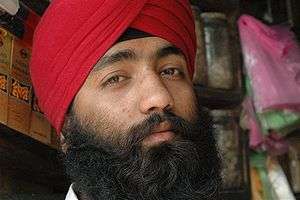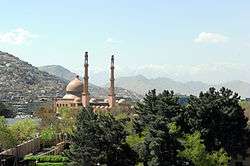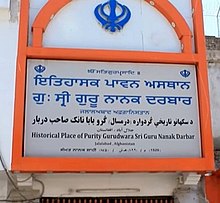Sikhism in Afghanistan
Sikhism in Afghanistan is limited to small populations, primarily in major cities, with the largest numbers of Afghan Sikhs living in Jalalabad, Ghazni, Kabul, and to a lesser extent Kandahar.[3] These Sikhs are Afghan nationals who speak Dari, Hindi and in their native Punjabi but also Pashto.[4]
 | |
| Regions with significant populations | |
|---|---|
| Jalalabad, Ghazni, Kabul, Kandahar | |
| 700 - 1000[1][2] | |
| Languages | |
| Hindko (native), Pashto, Dari, Hindi | |
| Religion | |
| Sikhism | |
| Related ethnic groups | |
| Sikhs, Punjabis | |
| Part of a series of articles on |
| Religion in Afghanistan |
|---|
 |
| Majority |
| Sunni Islam |
| Minority |
|
| Historic/Extinct |
| Controversy |
|
|
| Part of a series on |
| Sikhism |
|---|
 |
|
|
Practices
|
|
|
General topics
|
Their population in Afghanistan has dwindled since the Afghan wars began.[5] Estimates of their total population (there has been no census in Afghanistan since 1979) have been given as around 1,200 families or 8,000 members in 2013;[6] 1,000 in 2019 (as reported by Afghan Sikh Wolesi Jirga member Narinder Singh Khalsa); and around 700 in 2020 (as reported by Raj Sutaka, a Sikh businessman from Kabul).[1]
Presence

Kabul
There were over 200,000 Sikhs in Kabul in the 1980s, but after the start of the Civil War in 1992, most had fled.[7] Seven of Kabul's eight Gurdwaras were destroyed during the civil war. Only Gurdwara Karte Parwan, located in the Karte Parwan section of Kabul, remains.[8] They are centred today in Karte Parwan and some parts of the old city. There is no exact number of Sikhs in Kabul province.
Jalalabad
As of 2001, Jalalabad had 100 Sikh families, totaling around 700 people, who worship at two large Gurdwaras. Legend states that the older of the Gurudwaras was built to commemorate the visit of Guru Nanak Dev.[9] On 1 July 2018, at least 10 Sikhs were killed in a targeted suicide bombing at the PD1 market.[10][11] The local branch of the Islamic State of Iraq and the Levant claimed responsibility.[12]
Kandahar
Kandahar has a remarkably small Sikh community, with only about 15 families living there as of 2002.[13] Only 2 families remain as of 2020.
History
Early history
Guru Nanak visited Kabul in the 15th century. Some early Khatri Sikhs established and maintained colonies in Afghanistan for trading purposes.[14] Later, conflicts between the Sikh misls and empire against the Afghan-based Durrani Empire led to tension. Sikhs also served in the British Empire's military during several operations in Afghanistan in the 19th century.
20th century
Following the partition of India in 1947, the Sikh population increased as Sikh migrants fled persecution in the Punjab of newly independent Pakistan.[5] The Sikhs prospered during the kingship of Mohammed Zahir Shah (1933-1973) and the 1980s.[5]
Wars
During the 1980s Soviet–Afghan War, many Afghan Sikhs fled to India, where 90% of global sikh population lives; a second, much larger wave followed following the 1992 fall of the Najibullah regime.[15] Sikh gurdwaras (temples) throughout the country were destroyed in the Battle of Jalalabad (1989)[16] and the Afghan Civil War of the 1990s, leaving only the Gurdwara Karte Parwan in Kabul.[17]
Under the Taliban, the Sikhs were a relatively tolerated religious minority, and allowed to practice their religion.[9] However, the Sikh custom of cremation of the dead was prohibited by the Taliban, and cremation grounds vandalized.[17] In addition, Sikhs were required to wear yellow patches or veils to identify themselves.[18]
21st century
By tradition, Sikhs cremate their dead, an act considered sacrilege in Islam.[19][20][21][22][23] Cremation has become a major issue among Sikh Afghans, as traditional cremation grounds have been appropriated by Muslims, particularly in the Qalacha area of Kabul, which Sikhs and Hindus had used for over a century.[19] In 2003 Sikhs complained to the Afghan government regarding the loss of cremation grounds, which had forced them to send a dead body to Pakistan to be cremated, following which the Minister of Religious affairs investigated the issue.[15] Though the grounds were reported as returned to Sikh control in 2006,[17] in 2007 local Muslims allegedly beat Sikhs attempting to cremate a community leader, and the funeral proceeded only with police protection.[19] As of 2010, cremation in Kabul is still reported as being disapproved of by locals.[24]
Sikhs in Afghanistan continue to face problems, with the issue of the Sikh custom of cremation figuring prominently.
In September 2013, Afghan President Hamid Karzai signed a legislative decree, reserving a seat in the National Assembly of Afghanistan for the Hindu and Sikh minority.[25] However this decree was blocked by the parliament. The decree eventually came into force in September 2016 when it was approved by the cabinet of Karzai's successor, Ashraf Ghani.[26]
Following the deadly Jalalabad attack on June 2018, both Karzai and Ghani visited the Karte Parwan gurdwara to offer condolences. Ghani called the country's Sikh and Hindu minorities the "pride of the nation",[27] and on another occasion that year called them an "integral part" of Afghanistan's history.[28]
Diaspora
| Total population | |
|---|---|
| Unknown | |
| Regions with significant populations | |
| United Kingdom, India, Russia, Germany, Canada, Austria, Pakistan | |
| 9,194-75,000[29] | |
| >10,000[30] | |
| 2,000[31] | |
| Languages | |
| Hindko (native),English, Hindi , Punjabi, Pashto (older generation), Dari (older generation) | |
Before the 1990s, the Afghan Sikh population was estimated around 50,000.[17][32] As of 2013, they are around 800 families of which 300 families live in Kabul.[6] Sikh leaders in Afghanistan claim that the total number of Sikhs is 3,000. Many Sikh families have chosen to emigrate to other countries including, India, North America, the European Union, the United Kingdom, Pakistan, Russia and other places.[33]
Notable people
- Awtar Singh, member of the National Assembly of Afghanistan[34][35]
- Anarkali Kaur Honaryar, member of the Afghan Independent Human Rights Commission and 2009 Radio Free Europe Afghanistan "Person of the Year"
Apart from these, Jai Singh Fani was 1st Member of Parliament who was elected as Independent candidate and he died prematurely at a young age of 37 years on 25 April 1977. After him Gajinder Singh Safri became the second Sikh MP of Afghanistan and he happened to be Jai Singh Fani's brother in law & he left for U.K. with his family and took political asylum there because of the political unrest in Afghanistan.
References
- "Solidarity for Sikhs after Afghanistan massacre". www.aljazeera.com. Retrieved 27 March 2020.
- "Country Policy and Information Note Afghanistan: Sikhs and Hindus/" (PDF). Retrieved 27 March 2020.
- U.S. State Department. "Afghanistan - International Religious Freedom Report 2007". The Office of Electronic Information, Bureau of Public Affair. Retrieved 4 July 2009.
- Shaista Wahab, Barry Youngerman. A Brief History of Afghanistan Infobase Publishing, 2007. ISBN 0-8160-5761-3, ISBN 978-0-8160-5761-0. Pg18
- "Explainer: who are the Afghan Sikhs?". The Conversation. 20 August 2014.
- "Hindus, Sikhs warn of leaving Afghanistan". Pajhwok Afghan News. 31 July 2013. Retrieved 27 September 2013.
- https://www.thenational.ae/world/asia/afghan-hindus-and-sikhs-celebrate-diwali-without-pomp-and-splendour-amid-fear-1.668735
- "No Home for Afghanistan Sikhs". The Sikh Foundation International. Retrieved 8 March 2016.
- Sikhs set example for getting along with the Taliban. By Scott Baldauf, Staff writer of The Christian Science Monitor, 13 April 2001
- "Suicide Attack Targets Sikhs in Jalalabad, 19 Killed". TOLO. 1 July 2018.
- "Deadly blast hits Afghanistan's Jalalabad". Al Jazeera English. 1 July 2018.
Ghulam Sanayi Stanekzai, Nangarhar's police chief, said the explosion was caused by a suicide bomber who targeted a vehicle carrying members of the Sikh minority who were travelling to meet the president.
- https://www.independent.co.uk/news/world/asia/isis-suicide-bomber-jalalabad-afghanistan-islamic-state-sikhs-hindus-dead-a8426476.html
- "Focus on Hindus and Sikhs in Kandahar". IRIN. Retrieved 9 March 2016.
- Hew McLeod (1997). Sikhism. New York: Penguin Books. p. 251. ISBN 0-14-025260-6.
- Majumder, Sanjoy (25 September 2003). "Sikhs struggle in Afghanistan". BBC News.
- https://www.nytimes.com/1989/04/02/world/rocket-kills-22-in-afghan-temple.html
- "Sikhs, Hindus reclaim Kabul funeral ground - World - DNA". Dnaindia.com. 8 January 2006. Retrieved 1 September 2012.
- Magnier, Mark; Baktash, Hashmat (10 June 2013). "Afghanistan Sikhs, already marginalized, are pushed to the brink". Los Angeles Times. ISSN 0458-3035. Retrieved 8 March 2016.
- Hemming, Jon. "Sikhs in Afghan funeral demonstration « RAWA News". Rawa.org. Retrieved 1 September 2012.
- "Afghanistan's Sikhs feel alienated, pressured to leave". The Times of India.
- "Why are Afghan Sikhs desperate to flee to the UK?". BBC News.
- Margherita Stancati and Ehsanullah Amiri (13 January 2015). "Facing Intolerance, Many Sikhs and Hindus Leave Afghanistan". WSJ.
- Ali M Latifi. "Afghanistan's Sikhs face an uncertain future". Al Jazeera.
- "Sikhs, Hindus celebrate in Kabul". Pajhwok Afghan News. 14 April 2010. Retrieved 1 September 2012.
- "1 Wolesi Jirga seat reserved for Hindus, Sikhs". pajhwok.com.
- https://thewire.in/world/afghan-government-approves-reservation-for-sikhshindus-in-parliament
- https://www.hindustantimes.com/world-news/jalalabad-blast-afghan-president-visits-gurdwara-promises-action-against-culprits/story-bP9QY7WpKCY6x2VlTdDRVP.html
- http://www.currentriggers.com/world/afghan-hindus-sikhs-meet/
- IP Singh (23 December 2019). "Punjab: No clarity on exact number of Afghan Sikhs in India". The Times of India.
- Pritpal Singh (21 May 2017). "HINDU KUSH TO THAMES". Youtube.
- Valva Bezhan (25 December 2017). "Moscow's 'Little Kabul'". Radio Free Europe.
- Jethra, Aashish (27 August 2010). "2 Sikhs in Afghan poll fray, want to be first elected non-Muslims". SikhNet. Retrieved 1 September 2012.
- Stancati, Margherita; Amiri, Ehsanullah. "Facing Intolerance, Many Sikhs and Hindus Leave Afghanistan". The Wall Street Journal. ISSN 0099-9660. Retrieved 8 March 2016.
- Sikhs struggle for recognition in the Islamic republic, by Tony Cross. 14 November 2009.
- Bogos, Elissa (13 January 2010). "Afghanistan: Dwindling Sikh Community Struggles To Endure in Kabul". SikhNet. Retrieved 1 September 2012.
External links
- Al-Jazeera report on Afghan Sikhs
- Interviews in the Old City of Kabul
- The Afghan Sikhs face new threat. Deccan Herald, 12 November 2010
- Afghan Sikhs: Forgotten Victims. The Guardian; 6 July 2010
- Afghanistan: Sikhs rebuilding gurdwaras. Gurinder Randhawa - Indo-Asian News Service 25 Aug 2005
- 300 more Afghan Sikhs flee, India waives visa terms. Times of India, 20 Oct 2001.
- A NATION CHALLENGED: LIFE IN KABUL; Keeping Their Faiths Under Taliban Rule Drew Sikhs and Hindus Together. Amy Waldman, New York Times, 20 January 2002
- Pakistan: The Embattled Sikhs in Taliban Territory